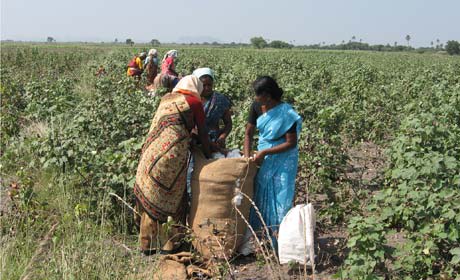The corporate world is a dicey place, but few multinationals can hold a candle to the loathsomeness of biotech giant Monsanto. From almost the very beginning, it has done its best to rush products to the market that are dangerous and unsafe: a weed-killer billed as biodegradable is in fact quite toxic; cancer-causing agents have been concealed; and whole communities have been poisoned for generations by its sleazy industrial practices.
But this hasnt stopped it from infiltrating the FDA, ramming its products through approval, and inventing genetically modified growing systems that trap poor farmers worldwide and keep them buying their products at exorbitant and bank-breaking prices.
Marie-Monique Robin makes quite a case against the ubiquitous capitalists, arguing that they essentially want to control food production itself through the implementation of their patents, with the non-GM food supply being contaminated to the point that we may need their support products to grow anything at all.
Robin is a tad strident in her presentation, showing herself seated at a computer with furrowed brow, searching Google for her interview subjects; its not a terribly exciting conceit and it only makes the film less dynamic. But her clever structuring begins on a low summit of standard irresponsibility and goes down a slippery slope to the economic totalitarianism, which the company represents.
By the time weve reached the end, Monsanto has been trounced, as possibly expected. Whatever qualms I have about the aesthetics, lets face it, its not like its not a saga packed with interest (or horror). And my hat is off to Robin for slowly reaching into the muck and dragging out the monster.
(Mongrel Media)But this hasnt stopped it from infiltrating the FDA, ramming its products through approval, and inventing genetically modified growing systems that trap poor farmers worldwide and keep them buying their products at exorbitant and bank-breaking prices.
Marie-Monique Robin makes quite a case against the ubiquitous capitalists, arguing that they essentially want to control food production itself through the implementation of their patents, with the non-GM food supply being contaminated to the point that we may need their support products to grow anything at all.
Robin is a tad strident in her presentation, showing herself seated at a computer with furrowed brow, searching Google for her interview subjects; its not a terribly exciting conceit and it only makes the film less dynamic. But her clever structuring begins on a low summit of standard irresponsibility and goes down a slippery slope to the economic totalitarianism, which the company represents.
By the time weve reached the end, Monsanto has been trounced, as possibly expected. Whatever qualms I have about the aesthetics, lets face it, its not like its not a saga packed with interest (or horror). And my hat is off to Robin for slowly reaching into the muck and dragging out the monster.
